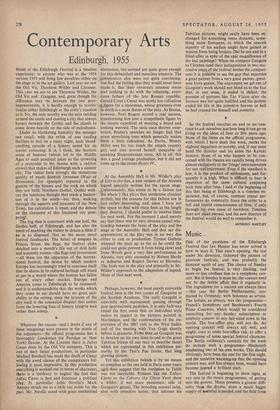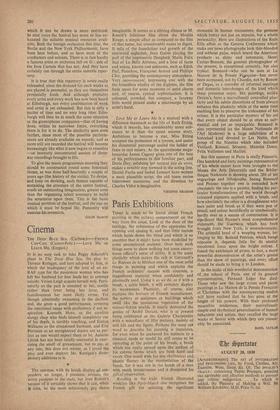Music
ONE of the problems of the Edinburgh Festival that Ian Hunter has never solved is how to start it. This year's opening, the last under his direction, followed the pattern of previous festivals, and was probably the dampest squib of any. The choice of Sunday to begin the festival is very limiting, and more or less confines him to a symphony con- cert. But if Sunday it must be, the concert need not he the feeble affair that it regularly is. The ingredients for a success are always there —this year the Berlin Philharmonic, con- ducted by Ormandy, with Solomon as soloist. The failure, as always, was the programme- Franck's Symphony and Beethoven's Fourth Piano Concerto, which would be considered unexciting for any Sunday subscription or celebrity concert in any fair-sized town in the world. The box-office plea will not do. An opening concert will always sell well, and ought, even at some box-office risk, to offer a programme of some special festival character. The Berlin orchestra's concerts for the week do include such a programme—Hindemith conducting two of his own works. This should obviously have been the one for the first night, and the tentative warming-up that the opening concert was, and has always been, would have become instead a brilliant start.
The festival is beginning to show signs, at any rate in the music programmes, of getting into the groove. Music presents .a greater diffi- culty than the drama, since a much bigger supply of material is needed, and the field from which it can be drawn is more restricted. In nine years the festival has more or less ex- hausted the suitable musical resources avail- able. Both the foreign orchestras this year, the Berlin and the New York Philharmonic, have been here before, and so have most of the conductors and soloists. There is in fact hardly a famous artist or orchestra left on th:,i side of the Iron Curtain that has not. And they have certainly run through the entire suitable reper- tory.
It is true that this repertory is never really exhausted, since the demand for such works as arc played is perennial, as they arc themselves perennially fresh. And although probably every artist and every work has now been heard at Edinburgh, not every combination of work and artist is yet exhausted. But this is only a matter of time and no very long time. Edin- , burgh will then be in much the same situation as the gramophone companies—that of having done, within its narrower limits, everything there is for it to do. The similarity goes even further, since most of the possible perform- ances are already available on records, and as more still are recorded the festival will become increasingly like what it now begins to resemble —an intensely concentrated session of three- star recordings brought to life.
To give the music programmes meaning they should be constructed round some historical theme, as was done half-heartedly a couple of years ago (the history of the violin). To devise, and keep on devising, such themes capable of sustaining the structure of the entire festival, needs an outstanding imagination, greater even than the organising talent necessary to build the structures upon them. This is the basic musical problem of the festival, and the one on which it must be hoped Mr. Ponsonby will exercise his invention.
COLIN MASON



































 Previous page
Previous page